

COLLEGIAT ETIMES

GRAD SCHOOL

TURNING POINT USA CONTINUES TOUR AT VIRGINIA TECH
Megan Dahn and Jacob Luckenbaugh | News Writers
Glenn Youngkin and Megyn Kelly attended Virginia Tech for the event.
On Sept. 24, Turning Point USA hosted the second stop of the American Come Back Tour after the death of Charlie Kirk, at Virginia Tech’s Burruss Auditorium.
The event hosted journalist and talk show host Megyn Kelly and Governor Glenn Youngkin, who shared personal accounts of their relationship with Charlie Kirk and encouraged productive political discussion.
“The reason is to send a message that we will not be silenced by an assassin’s bullet, by a heckler’s veto, by a left-wing woke professor or anyone who tries to silence us from saying what we really believe,” Kelly said.
Before doors opened at 5:30 p.m., students and attendees lined the sidewalk of Drillfield Drive, where they had the chance to speak with likeminded peers.
OUR CORE VALUES
Impartiality means reporting, editing and delivering the news honestly, fairly, objectively and without opinion or bias.
Credibility is the greatest asset of any news medium, and impartiality is the greatest source of credibility.
To provide the most complete report, a news organization must not just cover the news, but uncover it. It must follow the story wherever it leads, regardless of any preconceived ideas on what might be most newsworthy.
The pursuit of truth is a noble goal of journalism. But the truth is not always apparent or known immediately. Journalists’ role is therefore not to determine what they believe at that time to be the truth and reveal only
“We’re young adults now. We’re going to be the next generation of voters. I think seeing for yourself what people are saying, having in person conversations; everyone in this line is probably Republican, so then talking to other people. Then, if there’s democratic events, talking to all the Democrats,” said Rylee Arensdorf, a freshman at Virginia Tech.
During the event, TPUSA representatives honored the life of Kirk with a memorialized chair and a video showcasing his life’s mission.
“Who will be the next Charlie? And as I look out in this room, I see thousands of you, and I want to repeat the best answer that I have heard. You will be the next Charlie. All of you,” Youngkin said.
Governor Youngkin also announced a $100,000 donation to TPUSA to support
the growth of new campus chapters throughout Virginia. He did not specify the source of the donation.
At the end of the event, Kelly continued Kirk’s practice of answering audience questions. Students were able to challenge Kelly’s beliefs and ask personal questions about her experience. An anonymous student asked Kelly how to approach a required course for her major which revolves around identity and inclusion, and gained insight from Kelly about addressing an uncomfortable classroom environment.
TPUSA received backlash throughout the event from Virginia Tech campus organizations including, Young Democratic Socialists of America, The Black Coalition of Blacksburg and Students for Justice in Palestine. Students gathered in front of Burruss
Hall to carry out the “Our Campus, Our Voices” rally.
According to the participating organizations’ announcement, their goals were to prevent division amongst students and “stand united and in solidarity to say hate has no home here.”
“To get political figures out here, it gets people talking, and then it gets people voting. I think that’s important. I think everybody should vote. I think that’s one of the main reasons why we should have more events like this. Either side, it’s important,” said Mannix Wilhoit, a senior at Virginia Tech. Students interested in getting involved in political student organizations are encouraged to join the Virginia Tech chapter of Turning Point USA or alternative organizations that encourage constructive dialogue.

that to their readers, but rather to report as completely and impartially as possible all verifiable facts so that readers can, based on their own knowledge and experience, determine what they believe to be the truth.
When a news organization delivers both news and opinions, the impartiality and credibility of the news organization can be questioned. To minimize this as much as possible there needs to be a sharp and clear distinction between news and opinion, both to those providing and consuming the news.
Voice your opinion. Send letters to the Collegiate Times.
365 Squires Student Center
Blacksburg, VA, 24061
opinionseditor@collegiatetimes.com
All letters must include a name and phone number. Students must include year and major. Faculty and staff must include position and department. Other submissions must include city of residence and relationship to Virginia Tech (i.e., alumni, parent, etc.). We reserve the right to edit for any reason. Anonymous letters will not be printed.
Letters, commentaries and editorial cartoons do not reflect the views of the Collegiate Times. Editorials are written by the Collegiate Times editorial board, which is composed of the opinions editors, editor in chief and managing editors.
NEWSROOM 231-9865
Editor-in-Chief: Michaela Scott (editor@collegiatetimes.com)
Managing editor: Ayisha Surani
Design editor: Annmarie Leake
Assistant Design editors: Caroline Rogers and Sarah Jordan
Copy editors: Emily Southern and Olivia Guy
News editor: Erin Bailey
Assistant News Editor: Max Painchaud
Lifestyles editors: Emma Duncan
Assistant Lifestyles editors: Cat Pizzarello and Ella Winterling
Sports editors: Sam Mostow, Thomas Bray and Dylan Tefft
Opinions editor: Jenna Mason
Assistant Opinions Editor: Mohib Amjad
Photo editor: Hamad Alhendi
Assistant Photo editor: Riley Thompson
Have a news tip? newstips@collegiatetimes.com
BUSINESS STAFF 231-9860
Business manager: Greg Patterson (business@collegemedia.com)
MEDIAMATE 888-897-7711 collegiatetimes.com/media_kit/ orders@mymediamate.com
The Collegiate Times, a division of the Educational Media Company at Virginia Tech, was established in 1903 by and for the students of Virginia Polytechnic Institute and State University. The Collegiate Times is published every Tuesday of the academic year except during exams and vacations. To order a reprint of a photograph printed in the Collegiate Times, visit reprints.collegemedia.com. The Collegiate Times is a division of the Educational Media Company at Virginia Tech, Inc., a 501(c)3 nonprofit with a mission to provide educational experience in business and production of mass media for Virginia Tech students. © Collegiate Times, 2020. All rights reserved. Material published in the Collegiate Times is the property thereof, and may not be reprinted without the express written consent of the Collegiate Times.
Advertisements do not necessarily reflect the opinions of the Collegiate Times. Read about our organization’s Core Values online at collegiatetimes.com.
Jonathan Mususa | News Staff Writer
College Republicans and Young Democrats share the stance on their clubs.
With Election Day less than 50 days away and the assassination of conservative activist Charlie Kirk at Utah Valley University still on the minds of many, the work of Virginia Tech’s two main partisan clubs — the College Republicans and Young Democrats — has attained a heightened sense of significance.
In separate interviews with the Collegiate Times, College Republicans president Jack Medler and Young Democrats co-president Dawit Sheckler spoke about the state of their clubs, what they have been doing in the lead-up to Nov. 4, their experiences as politically active
students on campus and the impact of Kirk’s death on their work.
Jack Medler, president, College Republicans at Virginia Tech
Medler, a junior majoring in financial planning, considers his decision to join the College Republicans as a freshman a fairly simple one, given his conservative upbringing and desire for like-minded company.
“I went into GobblerFest looking to make more friends who are conservative,” he said. “I was interested in politics for a while and this was my step into it. I never really wanted to go into actual politics, but I

wanted to be adjacent to it, and I found that in the College Republicans.”
A self-described “conservative libertarian,” Medler listed his personal value system as having an “emphasis on freedom of speech, being pro-life (and) capitalism being the best economic system we have — not perfect by any means, but the best one we have.”
That being said, he confessed to not being especially vocal outside of his role as CRVT president.
“I don’t really like advertising that I’m conservative or vote Republican,” Medler said. “It’s not really my personality. If

someone asked me directly what I think, I’m not going to dance around the subject. I’ll just say it flat out.”
He later remarked that he felt this was a common sentiment among conservatives on campus.
Looking ahead to November, while hopeful that Delegate Obenshain, Gubernatorial Nominee Winsome EarleSears, Lieutenant-Gubernatorial Nominee John Reid and Attorney General Nominee Jason Miyares would all be victorious in their respective races, Medler recognized that there was much to do between now continued on page 4

MEET THE PARTIES: WHERE THINGS STAND WITH THE COLLEGE REPUBLICANS AND YOUNG DEMOCRATS AS ELECTION SEASON STARTS READY FOR WHAT’S NEXT?
Take your next step to success with Marymount. Advance your career, explore a new field, or grow as a leader through graduate programs built for flexibility and personal attention.
Study on campus in Arlington, online, or in a hybrid format, and connect with professors and peers who champion your success. Your future awaits—let’s begin.

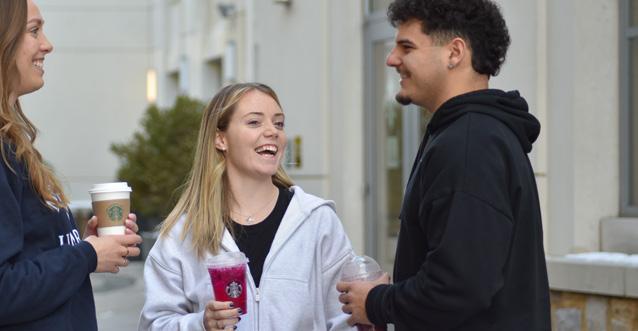
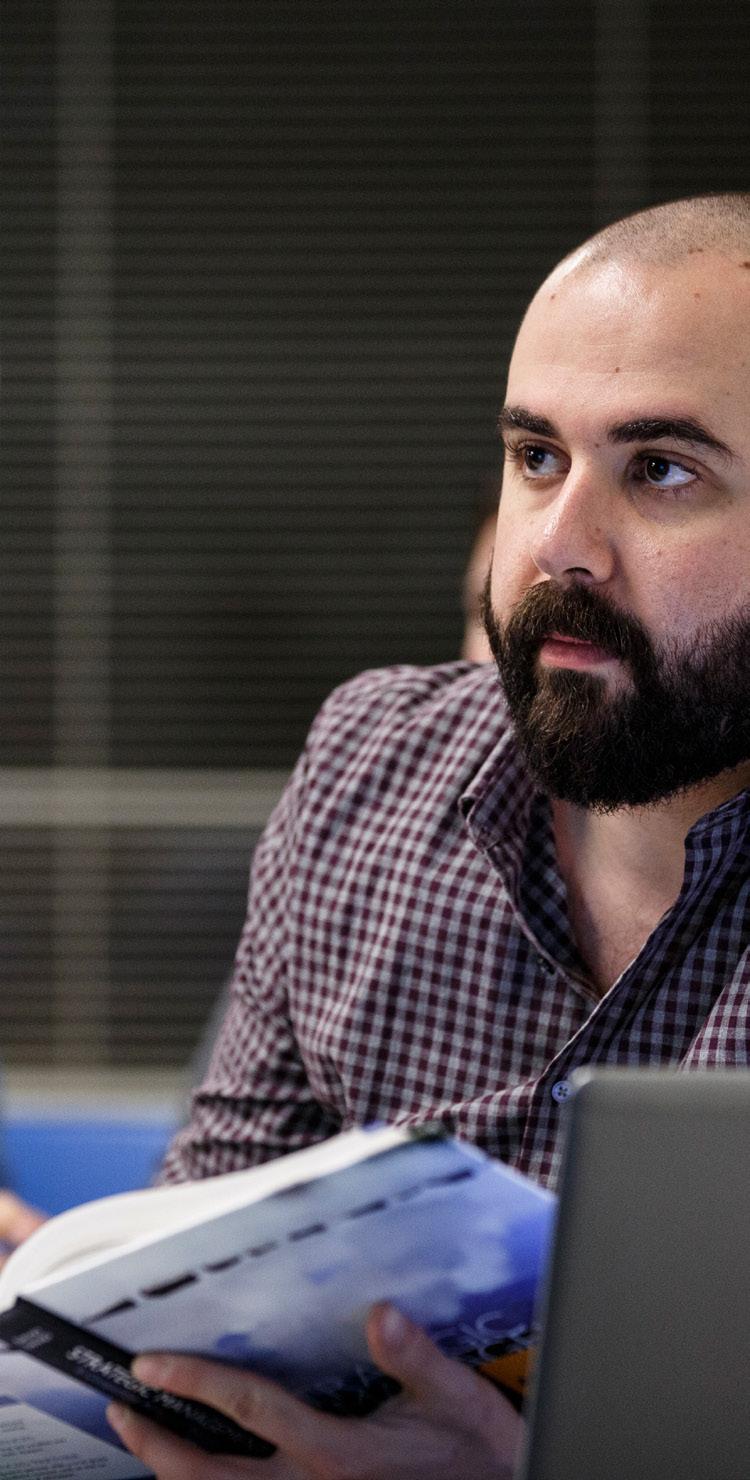

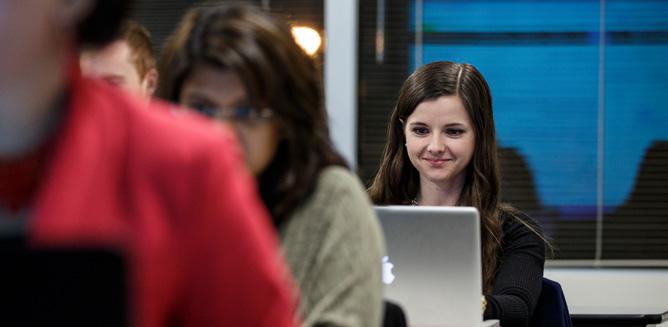
continued from page 3 and Election Day. However, if what’s past is prologue, the work will be rather pleasant.
“We’ve never had any very negative interactions with people when we doorknocked,” he said. “We’ve always had very positive interactions with people registering to vote. Even if they wholeheartedly disagreed with us, they would still register with us because they respected that we don’t care who you’re voting for. We just care if you’re going to register.”
This interview took place two days after Kirk was killed at Utah Valley University. Medler was in his band class the day of his death and only found out when the College Republicans group chat was inundated with his fellow club members’ shocked reactions.
“When class ended officially, I was able to read everything that happened,” Medler said. “I immediately thought, ‘Oh no. This is how you breed radicalism — tit for tat — and, depending on how the country handles this, it can either be a way to unify people and promote freedom of speech or it can just devolve very quickly, very fast.’”
After the interview, the College Republicans and Turning Point USA at Virginia Tech would hold a candlelight vigil
for Kirk at the War Memorial Chapel that night. Medler remarked on the presence of “numerous other political and religious organizations” at the event, including some members of the Young Democrats.
“I think it is a good idea to have them there just because, from what I heard, they were just as appalled and horrified about his passing and murder, and having them there will send a message that political violence won’t be tolerated on any side of the aisle.”
Dawit Sheckler, co-president, Virginia Tech Young Democrats
Sheckler, a junior majoring in political science, also considers his decision to join the Young Democrats an easy one.
“My views just align with the views of the Democratic Party,” he said. “I believe it’s an inclusive party. I believe it’s a party that fights for the marginalized and a party that believes in economic justice.”
As someone who has been working as a campus organizer for Democratic campaigns and progressive causes throughout his time in Blacksburg, Sheckler found Virginia Tech’s campus to be a welcoming place for dialogue.
“I mean, we have a lot more work to do in making people feel comfortable
expressing their views,” he said, “but, me personally, I’ve never been treated badly, so to say, for my views. There’s a good community here and I’ve met people who also share the values I have and that’s comforting so I would say my experience overall has been solid.”
With the state of the Democratic ticket, Sheckler spoke optimistically about the Democrats’ prospect in November.
“Great candidates” in Gubernatorial Nominee Abigail Spanberger, LieutenantGubernatorial Nominee Ghazala Hashmi and Attorney General Nominee Jay Jones and a “phenomenal candidate” in Lily Franklin.
“All eyes are on Virginia right now,” he said. “This is our chance to convince the public again why Democratic values are the one that are going to get us in the right direction.”
Among the issues that have come up in conversations he has had with students are the cost of living, access to abortion and freedom of speech.
“People want to feel like that this is a university where open discussion is encouraged and people with different views have a safe space to discuss those different views,” Sheckler said.
Although the impact of Charlie Kirk’s death on young conservatives has been widely reported on, Sheckler feels as if many young liberals were shocked and appalled.
“I personally disagreed with Charlie Kirk on virtually every issue, but I think our democracy doesn’t work unless there is a safe environment to bounce ideas off each other,” he said. “That’s what our highest ideals demand, and political violence is not a way to deal with people you disagree with. It’s corrosive to the values that make this country the envy of the world.”
Sheckler shared something he learned about Gen Z voters after three years with the campus organization.
“I would say, you know, some people talk about how my generation is apathetic. They don’t care. I don’t think that’s correct. I think we just really do want authentic candidates, people who actually care about the issues we care about and I feel like we do have a few of those people on the ballot in November.”

@COLLEGIATETIMES

BEYOND THE BOOKS: SUPPORT SERVICES FOR GRADUATE STUDENTS
Anna Payne | Lifestyles Staff Writer
When graduate students need someone in their corner, Virginia Tech is there.
Within the Virginia Tech Graduate School, the Student Services, Inclusion, and Strategic Partnerships (SSISP) team offers a range of resources to support the needs of both current and prospective graduate students.
In collaboration with campus departments like Student Affairs, Career and Professional Development and InclusiveVT, the goal of SSISP is to “ensure that graduate students have every opportunity to thrive and succeed,” according to the Graduate School webpage.
“Student Affairs is for all students, but a lot of their programming is geared a little more towards undergrads,” said Lauren Surface, the director of Student Services. “So, we (SSISP) were kind of helping fill that need.”
Surface began working at Virginia Tech in 2006 as a student services coordinator and became director of the department in 2022. She shared that
some of her favorite aspects of her job are connecting with and providing support for students.
“I would like to be able to meet graduate students, learn about their lives, where they’re from, what’s going on in their lives and how I can support them,” Surface said. “It’s very non-academic, but I’m helping them maintain that work-life balance or get through a hard time so that they can succeed as a student academically.”
Graduate students come from all walks of life. The average age to obtain a master’s degree is 33 years old, according to Graduate Guide. Nearly a third of graduate students have families, as stated by Urban. Additionally, Tulane University reported that 42% of full-time students, both undergraduates and graduates, also hold a job.
“A lot of grad students are married or have children, so they have extra things they’re juggling, or they don’t have financial support from their parents or
they’re trying to do this all on their own,” Surface said.
The Little Hokie Hangout is an educational space devised to assist with graduate students’ childcare needs. The center is available to Virginia Tech graduate students, faculty and staff and is open on weekdays from 8:30 a.m. to 5:30 p.m.
Surface also expressed the need for living and well-being experiences for graduate students to be designed differently. Specifically, graduate students may benefit from having dedicated spaces where they can focus and feel comfortable, separate from undergraduate students.
“A lot of grad students don’t want to live with students that they could be teaching,” Surface said.
The Graduate Life Center is “tailored to provide a private, professional living atmosphere for 115 graduate students with single-or double-occupancy rooms
with a full private bath,” as shared by the housing department.
Virginia Tech Student Affairs showcases off-campus rental listings online to aid in students’ housing searches. Here, housing needs can be specified, such as location and pricing to assist in finding a suitable living situation.
Academically, the life of a graduate student is more independent and self-driven.
“You have to pave your own way. You have to figure out your path,” Surface said. “It’s just very different. It can be very isolating.”
The Graduate School offers a multitude of academic support resources tailored towards research, writing, teaching and computer software needs. Graduate students also have access to options to help cover the cost of their education.
An assistantship is a position that continued on page 6

requires 20 hours of work per week for the duration of the academic year; the work completed funds tuition and provides professional and educational experience. For more information on types of assistantships at Virginia Tech and eligibility requirements, visit their website.
40% of graduate students at Virginia Tech are international; their needs differ significantly from those of domestic
students. The Cranwell International Center at Virginia Tech serves international students academically and personally. Specifically for graduate students, Cranwell hosts an in-person international graduate orientation, where students can learn more about the center’s offered resources and socialize with others. Before arriving on campus, Cranwell offers a pre-arrival webinar series that assists international
students’ specific needs, such as securing a student visa.
In Surface’s opinion, a resource that remains underutilized is Career and Professional Development, a program designed to support students’ career exploration and opportunities. For graduate students, CPD can assist with finding assistantships and networking with faculty and professionals.
For students considering applying
to graduate school at Virginia Tech or currently studying here, make use of these resources to help make the upcoming transition easier.
“We really are trying to help students in every aspect of their lives, if possible,” Surface said. “Academically, personally and then prepare them for the world beyond.”

THE COST OF A DEGREE: FACING FOOD INSECURITY AS A GRADUATE STUDENT
When pursuing a master’s or doctoral degree, students have a lot on their plates. Lectures, research, classes and homework alone can be overwhelming, and that’s not factoring in students’ personal lives. Many graduate students have jobs to do, bills to pay and families to support in addition to their academic responsibilities.
some point in their college experience.
According to The Hope Center for Student Basic Needs, this combination of academic, emotional and financial stress causes 12% of graduate students across America to face food insecurity at
Feeding America defines food insecurity as a time “when people can’t access the food they need to live their fullest lives. … It’s when people don’t have enough to eat and don’t know where their next meal will come from.”
Graduate students are at an even higher risk of facing food insecurity for a multitude of reasons, including marital status, employment status or whether they have dependents, to name a few.
In the 2023 report, Student Food continued on page 7
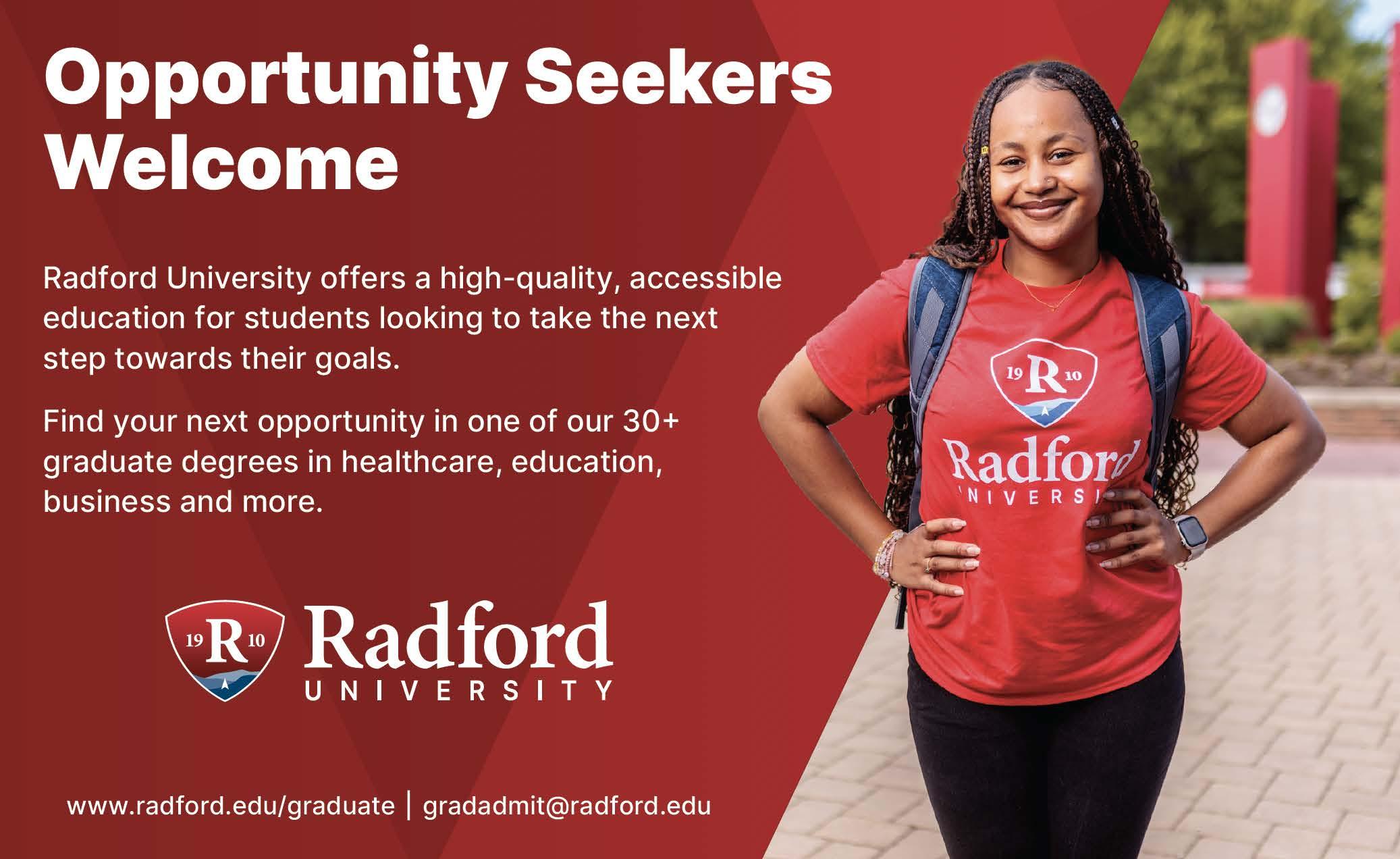
Cleo Dobson | Lifestyles Contributor
Security Status at Virginia Tech, 33.81% of undergrads and 35.71% of graduate students reported experiencing food insecurity — a third of the Virginia Tech student body. 22% of all respondents reported having very low food security, leading to chronic reductions in food intake. Food insecurity can negatively impact one’s academic performance, social life and mental health.
Virginia Tech is aware of this issue, and several organizations and programs are in place to support students, including The Market of Virginia Tech and 209 Marketplace.
The Market is a nonprofit organization that offers food support to Virginia Tech students and works to reduce the stigma surrounding food insecurity by creating a welcoming environment that makes aid more accessible. To bypass one of the biggest barriers in food support access, The Market’s nonperishable pantry is open to all students during its open hours and requires no prior paperwork or screening.
“Rising demand for our programs shows the need is growing,” said Izzy Largen, assistant director for food access initiatives at Virginia Tech. “Last year alone, visits to our Open Market Hours, the most accessible option for students, increased by 375%. 57% of all students who used our services last year were graduate students.”
In addition to their open market hours, The Market also uses a tiered support
system, so students who need it can apply to receive more aid.
“We place no limits on non-perishable or produce items, which allows students to take as much as they need to support themselves and their dependents,” Largen said. “We also work to source halal, kosher, gluten-free, vegan and vegetarian options so that students have access to foods that are culturally responsive and safe for their dietary needs.”
It might come as a surprise to some readers that food insecurity is so prevalent at Virginia Tech. That’s because it’s not as easy to identify as one would think.
“Too often, people try to apply fixed labels to an issue that is inherently dynamic,” Largen said. “A student may need food support one day and not need it the next day, so the idea that their lived experiences can be captured by a single, one-size-fits-all label like ‘food insecure’ does not align with the constantly shifting reality of college life.”
The Market’s team emphasizes that common misconceptions of what food insecurity looks like can prevent students from recognizing it for what it is. Food insecurity can manifest anytime there is a shortage of nutritious food, whether that’s through skipping meals regularly, relying on low-nutrition and high-calorie foods to save money or going 10 hours without access to food due to a full day on campus.
Time constraints and food access restrictions particularly affect graduate
students. When living off campus, as most graduate students do, returning home to prepare meals is sometimes impractical and costly; however, the alternatives can be even worse. Many are forced to choose between eating out, which can become expensive, or relying on fast, less nutritious snacks, or simply skipping meals until a better option arises.
Knowing these needs, 209 Marketplace, another campus resource fighting food insecurity, has adapted its services to better serve graduate students. 81.6% of their customers are graduate students.
“To adapt to the unique needs of graduate students, we try to stay open as much as possible over breaks, offer eggs and milk, have easy meals and snacks, and have clothing,” said Kai Mostek, student lead at 209 Marketplace. “We know that graduate students are on a different schedule than undergrads and don’t always have the chance of ability to travel home on breaks, so we try to always stay open over breaks and extend our hours.”
209 Marketplace is an emergency food bank that runs on a points system, where the points value of an item is based on its current cost and availability at the grocery store. Each person who shops at 209 Marketplace receives 50 points each week, with an additional 25 points for every dependent they may have.
“For example, ramen noodles cost half a point each, canned corn costs one
OPINIONS
point, jelly [and] jam costs two points, [a] one-pound bag of beans costs three points, [and] a two-pound rice bag costs four points,” Mostek said. “Each item is placed on a shelf that has a points label.”
In addition to supplying food, 209 Marketplace also provides toiletries, school supplies and clothes to Virginia Tech students. Staff members also take requests for items such as feminine pads, laundry soap and baby food.
In addition to the university’s professional staff and programs that increase student food access, there are also ways for students to get involved.
“The best way students can support their peers is by learning about the programs available on campus and sharing that information in an open, accessible way,” Largen said. “Raising awareness without stigma helps ensure students know where to turn when they need support.”
Both The Market and 209 Marketplace are nonprofit organizations, supported entirely by food and monetary donations. Visit the organizations’ websites for donation instructions.
During the semester, The Market’s open hours are Thursdays from 1 p.m. to 6 p.m. and Fridays from 9 a.m. to 12 p.m. and 209 Marketplace’s hours are every Monday and Thursday from 4:30 p.m. to 6 p.m.

@COLLEGIATETIMES
CUTTING THE ENGLISH MASTER’S PROGRAM IS DETRIMENTAL TO STUDENTS
Emelia Crump | Opinions Contributor
I was sitting in my first-year experience class, listening to a lecture outlining further education options within the Virginia Tech English department. I had that typical freshman excitement — the byproduct of being presented with various opportunities coated in the newfound autonomy of adulthood — and I quickly decided upon the English master’s program as a future target. It seemed perfect. I eagerly wanted to get there; I asked as many questions as I could about the program. This became my goal.
One of the answers I didn’t expect to receive was news of the program’s potential discontinuation. I’m devastated, to put it plainly. And I’m one among many. Liberal arts — the English department
specifically — serves as the communicative anchor of a technology-dominated institution. Cutting the English master’s program would encourage a community malnourished of cultural literacy and empathy. We need the master’s program to remain a balanced institution — otherwise, we jeopardize falling into a societal sinkhole lacking the holistic qualities needed to properly function in the broader world.
The loss wouldn’t just affect prospective master’s students. English master’s members perform as graduate teaching assistants, meaning undergraduate students in a variety of majors will lose that layer of support critical for literary success. Graduate TAs aren’t just instructional
figures, either — they’re students. They serve to bridge the gap between students and faculty. In a field where communication is downright essential, don’t we need that?
And what about research? Virginia Tech is a research institution. The master’s program allows students to obtain “individualized attention with award-winning and research-active faculty,” according to Virginia Tech’s English master’s information page. Removing this not only starves graduate students of research, but it strips away a layer of Virginia Tech’s research identity.
Cutting the English master’s program extends beyond Blacksburg — this is a national trend. According to a senior
official of the National Endowment for the Humanities, “millions of dollars in previously awarded federal grants intended for arts and cultural groups across the country (have recently been) canceled by the Trump administration.” It’s an efficiency-related cut — one that Virginia Tech is partaking in. We’re an institution that has claimed to “Invent the Future,” but how can we do that without the very communicators needed to articulate said future?
Graduate program enrollment is shrinking on a national level, which means finding them will only become more difficult. Students shouldn’t have to sacrifice attending a school they love just to continued on page 8
Without Virginia Tech’s English master’s program, students lose a path to their goals.
continued from page 7
further their studies. Prospective freshmen may even turn their heads if their college of choice doesn’t offer a sequential master’s program.
The benefits to the English master’s pipeline expand beyond campus. The program is imperative to the university’s land-grant statement, emphasizing the program’s potent local presence. Also, possessing an English graduate degree greatly heightens a graduate’s long-term earnings, an argument echoed by the Modern Language Association. Considering this,
canceling the master’s program doesn’t just represent a lack of further studies — discontinuing it washes away heightened earnings and job success for those in English-related fields. Considering the current uncertainty in the job market, this holds a lot of weight for students gearing up for employment.
It’s not just about job uncertainty, either — it’s about what humanities programs provide for society. With our generation comes the increased use of AI: An era where grasping the nature of humanity is imperative in understanding chatbot applications, especially surrounding textual analysis. We need
the humanities because they round out the university’s environment and purpose. Not only that, but they also strengthen the world we live in outside the academic context.
It’s a non-negotiable that VT is working with a strained research budget, but there are ways around discontinuation. From a student standpoint, institution budgeting details aren’t fully graspable, but that doesn’t mean we cannot grasp the importance of what’s at stake by losing the master’s program. It’s important that Virginia Tech fights for the humanities, especially when so much of our establishment is already
technology-dominated. We are proud to be enrolled here. We really are — it’s a fact as apparent as the Hokie Stone proudly plastered across campus buildings. We stand by our motto: “Ut Prosim” (That I May Serve). Likewise, the English community serves to critically question our world: The one that, especially now, so desperately aches to be challenged. English students want to be served back, and that starts with keeping the master’s program.

@COLLEGIATETIMES
HOKIES FOOTBALL REJUVENATED BY 23-21 WIN OVER NC STATE
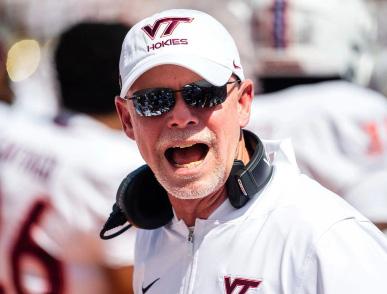
Former Virginia Tech head coach Brent Pry was notorious for his 1-12 record in one-score games.
Interim head coach Philip Montgomery exorcised that demon the first chance he got — with some help from kicker John Love.
The All-ACC honorable mention drilled field goals from 39 and 32 yards before nailing the game-winner from 49, lifting the Hokies over NC State 23-21 in Raleigh. Tech’s postgame jubilation told the story — for a program knee-deep in havoc through the
first three games of the year, the win meant everything.
“Just an incredible win by our guys and the way they fought,” Montgomery said after the game. “(Tech) came here with a mission and a passion about them and I couldn’t be more proud of them.”
It wasn’t just Love. Running back Terion Stewart fired off 175 rushing yards, including a game-changing 85-yard run to set up Cameron Seldon’s touchdown catch, and put Tech (2-3, 1-0 ACC) up 20-14 in the third.
“Stewart made some great runs,” Montgomery said. “Put his foot in the ground, broke tackles, had the explosive run right there late in the game. What a huge play that was. He’s a guy that continues to work and continues to want to get better. It couldn’t have gone any better for him tonight.”
NC State (3-2, 0-1 ACC) responded in the fourth with a 10-play, 75-yard touchdown drive capped off by a Jayden “Duke” Scott rushing touchdown, but the new one-point game was close enough for Love to end it.
Stewart broke off a 13-yard run up the middle on the second play of the drive, and quarterback Kyron Drones followed with chunk yardage to set up Love’s kick.
However, there was more work to be done.
The Hokies held onto the final 23-21 score for over six minutes, largely in part to a defense that had been impressive all night.
The Wolfpack’s final two possessions featured just five and seven plays, respectively, and it failed to enter Tech territory in both. A fourth-and-1 shutdown by Tech with 45 seconds left sealed the win.
NC State quarterback CJ Bailey opted to pass on that play, targeting Justin Joly but being spoiled by a Christian Ellis pass breakup — it was the senior safety’s third PBU of the night. After that, Drones took over, kneeled, and shut the door on the Wolfpack.
The defense was effective all night, with eight players recording a tackle for loss (Tech had eight) or sack (five). Isaiah Cash, Ben Bell, Jason Abbey, Elhadj Fall and freshman Noah Chambers notched one of each.
The Hokies found two vital touchdowns in the second and third quarters to ensure they stayed ahead of the Wolfpack.
The first was an 11-yard completion from Drones to Marcellous Hawkins to cap off a 10-play, 62-yard drive midway through the second. Next quarter, following an NC State touchdown via Keenan Jackson’s catch, Stewart and Seldon combined to turn the game on its head.
What could be a season-altering win for the Hokies — capped by a celebratory dance from Montgomery — ensued.
“When you have joy and when you have enthusiasm, when you have passion about it — wins are hard to come by,” Montgomery said. “Conference wins on the road are hard to come by, and you better enjoy them, you’d better celebrate them and we’re going to do that. So if an old man getting out there dancing looks silly, that’s okay. I don’t mind looking silly because we’re going to enjoy those wins that we get.”

Virginia Tech won its first one-score game since Nov. 19, 2022.
Dylan Tefft | Sports Editor
PHOTO COURTESY OF VT ATHLETICS
